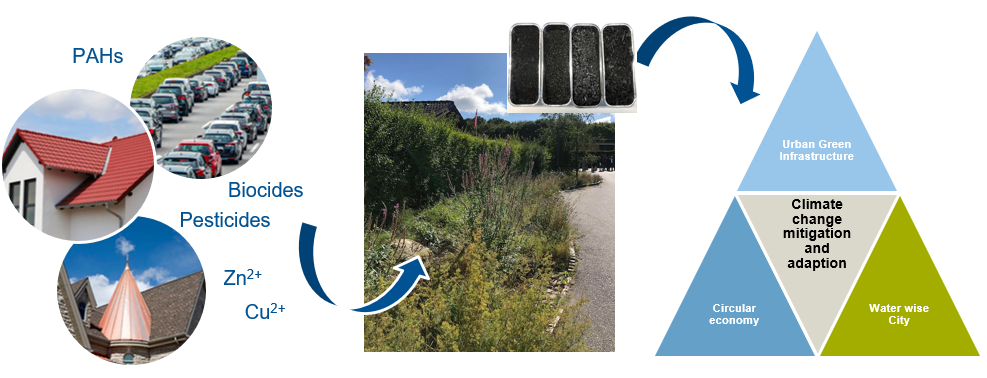Implementing Biochar and Compost in Vegetated Infiltration Swales as Green Infrastructure for Stormwater Treatment
Urban stormwater is a significant pollutant source that impairs the quality of waterbodies and can affect human health and ecosystems. As climate change will increase the frequency and intensity of extreme heavy rainfall and flooding, mitigating pollution from urban runoff is crucial for urban sustainability and climate change adaptation. Implementing green infrastructure –such as vegetated infiltration swales or bioswales– for urban stormwater management is a meaningful strategy for addressing this challenge, as it can provide various ecosystem services. However, although conventional bioswales can effectively remove sediments and particulate-bound pollutants, they can fail to remove dissolved pollutants in a reliable manner.
This project aims to improve the dissolved pollutant removal in vegetated infiltration swales by studying the implementation of organic soil amendments, focusing on biochar and compost. These materials are easily available, have low production costs, promote a circular resource use, and can potentially remove a wide set of contaminants. Furthermore, they support other functions important for the sustainable operation of bioretention swales, such as nutrient provision for plant uptake and the maintenance of favorable conditions for microbiota development. This project intends to achieve a better understanding of pollutant removal mechanisms in bioswales while exploring the potential benefits of implementing biochar as an organic soil amendment in these systems.
The project will involve laboratory and meso-scale experiments to test the removal of multiple dissolved pollutants (heavy metals, biocides and pesticides) in representative stormwater matrices in biochar- and compost-amended systems. The effect of combining low and high temperature pyrolyzed biochar to remove multiple contaminants with a higher efficiency and resilience to varying pollutant loads will also be evaluated. An assessment of increase in biodegradation of TOrCs will also be performed, as well as an evaluation of the effects of seasonal de-icing salts and different saturation conditions in bioswales.
This research is part of the interdisciplinary Research Training Group in Urban Green Infrastructure at the Technical University of Munich.

| Project Leader | Prof. Dr. Brigitte Helmreich |
| Researcher | Natalie Páez-Curtidor, M.Sc. |
| Funding | German Research Foundation (DFG) |